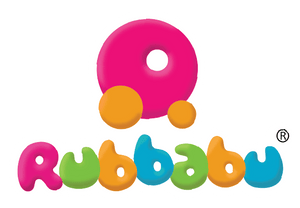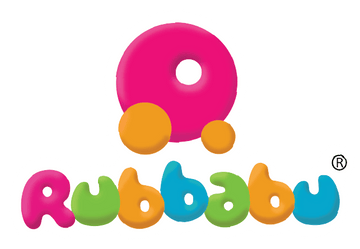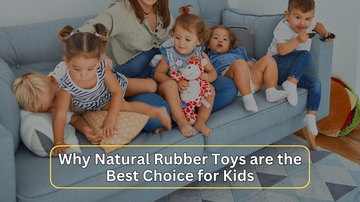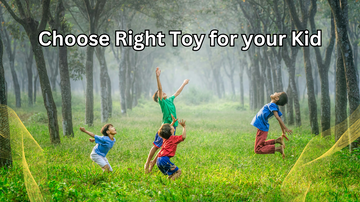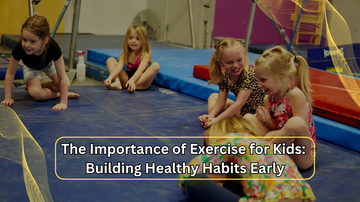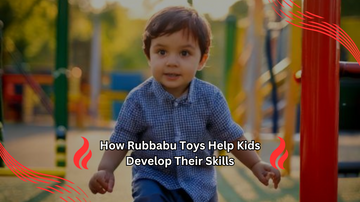
In the world of child development, play is not just a way for kids to have fun; it's a critical component of learning and growth. Among the myriad of toys available today, Rubbabu toys stand out as a unique and valuable resource for fostering various skills in children. Made from soft, natural rubber and designed with vibrant colors, Rubbabu toys are not only engaging but also serve as tools for developmental milestones. In this blog, we will explore how Rubbabu toys help children develop their skills across multiple domains, including fine motor skills, cognitive abilities, social skills, and emotional intelligence.
1. Fine Motor Skills Development
Fine motor skills involve the use of small muscles in the hands and fingers, crucial for tasks like writing, buttoning clothes, and manipulating small objects. Rubbabu toys, with their textured surfaces and various shapes, provide an excellent medium for children to enhance these skills.
Children can easily grasp, squeeze, and manipulate these toys, which encourages hand-eye coordination and dexterity. Activities like stacking, rolling, and sorting Rubbabu toys promote precision and control. The soft, pliable material also allows children to explore their creativity—whether they are building structures or creating imaginative scenarios—further enhancing their motor skills.
2. Cognitive Development
Cognitive skills, including problem-solving, memory, and critical thinking, are vital for a child's overall development. Rubbabu toys, with their colorful and diverse designs, engage children's minds in unique ways.
For instance, the different shapes and sizes of Rubbabu toys can stimulate curiosity and exploration. Children may naturally categorize the toys based on color, shape, or size, thereby enhancing their sorting and classification skills. Additionally, many Rubbabu toys encourage imaginative play, allowing children to create stories and scenarios that promote language development and narrative skills.
Moreover, Rubbabu’s open-ended play design allows for endless possibilities, encouraging children to think creatively and develop their problem-solving abilities as they navigate different ways to play.
3. Social Skills Enhancement
Play is a social activity, and Rubbabu toys facilitate interaction between children, promoting the development of essential social skills. When kids play together with Rubbabu toys, they learn to share, negotiate, and communicate effectively. These interactions are crucial for developing empathy and understanding others' perspectives.
Group play with Rubbabu toys can lead to cooperative games, where children must work together to build a structure or complete a task. Such collaboration teaches them about teamwork, patience, and the importance of listening to others. These social skills are foundational for building relationships in school and beyond.
4. Emotional Intelligence Development
Rubbabu toys also play a significant role in fostering emotional intelligence. As children engage in imaginative play, they express their feelings and explore various scenarios, helping them understand and manage their emotions. For example, a child might create a situation involving a Rubbabu character facing a challenge, allowing them to explore feelings like fear, joy, or frustration in a safe and controlled environment.
Additionally, the soft texture of Rubbabu toys provides a sensory experience that can be soothing for children. This sensory play can help them regulate their emotions, especially during times of stress or anxiety. As they engage with these toys, they can practice calming techniques and develop resilience, crucial skills for navigating life's challenges.
5. Sensory Development
Rubbabu toys are made from natural rubber, providing a unique tactile experience that engages children's senses. Sensory play is vital for cognitive development, as it helps children make sense of the world around them. The vibrant colors, soft textures, and varied shapes of Rubbabu toys stimulate visual and tactile senses, encouraging exploration and discovery.
Through sensory play, children can experiment with different textures, weights, and temperatures, which can be particularly beneficial for those with sensory processing challenges. Engaging with Rubbabu toys allows children to expand their sensory experiences and develop a better understanding of their own preferences and comfort levels.
6. Encouraging Independence and Confidence
As children play with Rubbabu toys, they also learn to be independent. The toys' simplicity encourages self-directed play, allowing kids to make choices about how they want to engage with them. This autonomy fosters decision-making skills and boosts self-confidence.
When children successfully create a structure or complete a task with Rubbabu toys, they experience a sense of accomplishment. This positive reinforcement builds their confidence, encouraging them to tackle more complex challenges in the future, both in play and in life.
Conclusion
Rubbabu toys are more than just colorful, fun objects; they are powerful tools for skill development. Through play, children enhance their fine motor skills, cognitive abilities, social interactions, emotional intelligence, sensory experiences, and independence. As parents and caregivers, choosing toys like Rubbabu can make a significant difference in a child's development.
Ultimately, play is an essential part of growing up, and Rubbabu toys offer a safe, engaging, and versatile option that nurtures various aspects of childhood development.
By investing in such toys, we are not just providing entertainment; we are paving the way for children to grow into well-rounded, capable individuals ready to face the world.
